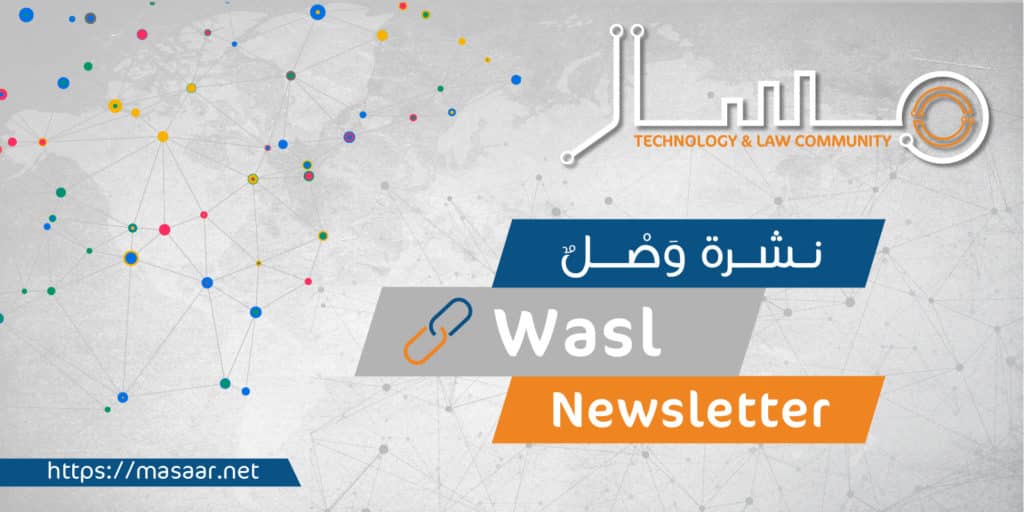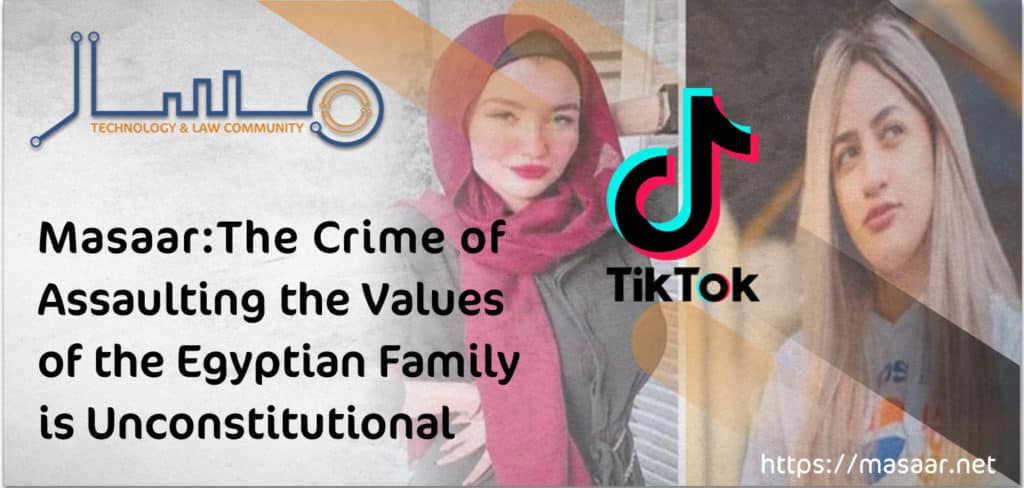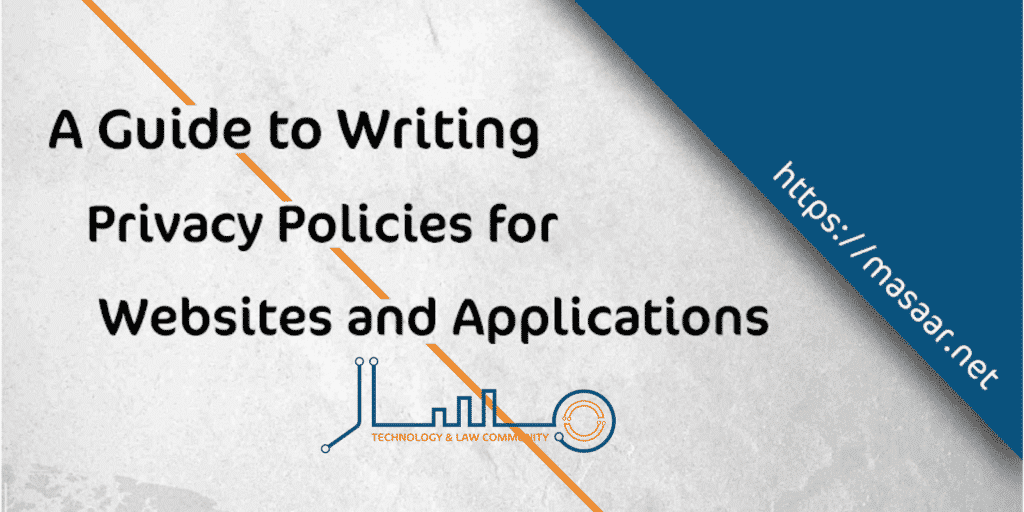“Wasl” Newsletter: The second issue
A non-periodical newsletter issued by Technology and Law Community “Masaar” on news and activities related to digital rights in Egypt.

MASAAR’s Activities
1. Masaar submits a memorandum to a court arguing that the crime of assaulting the values of the Egyptian family is unconstitutional
“Masaar” filed a memorandum arguing for the unconstitutionality of Article 25 of law No. 175/2018 on Combating Information Technology Crimes, known as “Anti-Cybercrime Law”, to Cairo’s Misdemeanors Economic Court of Appeal, in case No. 246 of 2020. The case includes accusations of assaulting the principles and values of the Egyptian family by publishing digital entertainment content on “Tik Tok” platform.

“Masaar” submitted this memorandum due to the repeated use of Article 25 by the investigation bodies and the law enforcement authorities, to suppress freedom of expression on various entertainment platforms and to restrict the freedom to use the Internet. The authorities have arrested around nine females since April 2020 and referred them to criminal trial. They were sentenced to prison, in addition to heavy fines for publishing entertainment content on some social media platforms. The authorities have justified the arrest of these women and girls by claiming that the materials they published violate the “principles and values of the Egyptian family.”
On July 27, 2020, Cairo’s Misdemeanors Economic Court sentenced all the defendants to two years in prison, a fine of LE 300 thousand for each of them and obliging them to pay the expenses of the lawsuit. The defendants appealed the sentence; the first appeal session was held on August 17, 2020. Cairo’s Misdemeanors Economic Court of Appeal decided to postpone the case to the September 14 session to hear the statements of the officer who conducted the investigations.
- Link to the news in Arabic: https://bit.ly/3gmQ6Uw
- Link to the memorandum: https://bit.ly/3heEap2
- Link to the news in English: https://bit.ly/3iWp0Fe
2. A Guide to Writing Privacy Policies for Websites and Applications
“Masaar” issued a guide to writing privacy policy for websites and applications. This guide aims to provide a number of tips that help make the privacy policies adopted by websites and applications more clear, understandable and easy to apply.

The guide also provides advice on how to maintain a balance between the users’ right to protect their privacy and control their data on the one hand, and the requirements of the service provider (website or application) in collecting information and data necessary to develop the services they provide, on the other hand.
“Masaar” also announced its willingness to provide voluntary assistance in writing privacy policies for various websites and applications.
- Link to the guide in Arabic: https://bit.ly/3gjtkfY
- Link to the guide in English: https://bit.ly/3gbyhHD
3. The last space for free expression: Systematic censorship of the Internet claiming to protect morals
“Masaar” released an analytical summary on the arrest of a number of girls and women for publishing entertainment content on the Internet. The authorities claimed that this content violated the standards of morality prevailing in society.

This summary aims to try to understand the recent practices of the Egyptian authorities regarding their widespread and systematic surveillance of a certain type of content on the Internet, and the extent of the compatibility of these practices with the regulations of arrest, investigation, and the collection of evidence stipulated in the Egyptian Criminal Procedure Law. This is particularly important because of the public prosecution’s tendency to protect what it called the “fourth borders”. According to a statement by the public prosecution the “fourth borders” means that “we are in front of new cyber borders whose domain is websites, which needs deterrence and total precaution to guard them like other borders.” This indicates the authorities’ tendency to have security and legal control over digital platforms, as they have controlled other spaces available for free expression such as protests and the press.
- Link to the analytical summary in Arabic: https://bit.ly/3j3Iqbr
4. 8-bit: Internet Censorship in the Arab Region
Masaar “Community for Technology and Law” and Smex “Social Media Exchange”, held a webinar on Wednesday, 10 June, on “Internet Censorship in the Arab Region”, which is the second of a series of discussions entitled “8-bit” that Masaar started with a discussion on “Tools and Applications of Digital Security in Remote Work”.

The webinar discussed Arab governments’ dealing with the spread of the novel corona virus and its impact on Internet users. The speakers reviewed the laws restricting freedom of expression on the web and legal texts used to impose Internet censorship and also governments’ policies regarding websites blocking.
Speakers from five Arab countries participated in the session: Reem Al Masri, Jordan, Marwa Fatafta, Tunisia, Mona Shtaya, Palestine, Mohamad Najem, Lebanon, and Mohammad El-Taher, Egypt.
- Link to the discussion in Arabic: https://bit.ly/3iVYegj
- Link to the discussion in English: https://bit.ly/3iUfhPC
5. Developing a list to test the blocked websites in Egypt
“Masaar” contributed to developing the list of websites (for Egypt) subject to testing by the OONI project, which is the most important international initiative working to monitor and document incidents of Internet censorship in countries around the world.
6. A guide to establishing a technical observatory to monitor the incidents of Internet censorship.
“Masaar” published a technical guide for organizations interested in monitoring and documenting Internet censorship. This guide focuses on automating data collection and measurements from the Internet and analyzing them, in order to detect the presence of blocked websites or technologies to monitor the Internet and communications based on Raspberry Pi computers and the UniPropp software.
Link to the guide: https://github.com/masaarnet/Ooni-Probe-installation-on-Raspberry-Pi
Publications by civil society organizations
1. “Assaulting citizens’ private lives in the name of the law”, the Arabic Network for Human Rights information
The Arabic Network for Human Rights Information issued a research paper that briefly outlines the articles of Law No. 175 of 2018, regarding Anti-Cyber and Information Technology Crimes; related to the protection of citizens’ personal data and communications, and the powers of the security services -specifically what the law called ‘the national security agencies’- to have access to this information.
The paper aims to:
1- Informing citizens how this law provides for the protection of their personal data.
2- Indicating the extent to which this law ensures the required balance between the requirements of public interest and the protection of citizens’ right to privacy and the consequent protection of their security and safety.
- Link to the paper in Arabic: https://www.anhri.info/?p=18261
- Link to the paper in English: https://www.anhri.info/?p=18273&lang=en
2. A campaign demanding to unblock websites: The Association for Freedom of Thought and Expression
The Association for Freedom of Thought and Expression (AFTE) launched a campaign demanding to unblock websites, especially independent press websites, under the slogan “#Free_Internet_ for_Free_Press”. The campaign launched by AFTE included the publication of a study entitled “Out of sight: A study on the effects of three years of blocking news websites”. It also published an update to the Tor Browser usage manual to bypass Internet censorship. Tor helps the Internet user protect his privacy and security on the Internet by hiding his digital identity and encrypting Internet connectivity. AFTE also published an update of the list of blocked websites in Egypt.
- Link to the campaign in Arabic: https://bit.ly/3ggEPVA
- Link to the campaign English: https://bit.ly/3l3usIl
3. Legislations of Darkness, the Arabic Network for Human Rights information
The Arabic Network for Human Rights Information issued a study entitled “The legislations of darkness”. The study reviews some of the most important laws that were enacted during seven years (June 2013 – June 2020), such as the law regulating the right to public meetings, processions and peaceful demonstrations, the law on the exercise of political rights, the law regulating the lists of terrorist entities and terrorists, the law on the institutional organization of the press and the media, and the anti-cyber and information technology crimes law, etc.
- Link to the study in Arabic: https://www.anhri.info/?p=17555
- Link to the study in English: https://www.anhri.info/?p=17570&lang=en
4. Out of sight! the Association for Freedom of Thought and Expression
This study sheds light on how the Egyptian authorities use internet censorship against websites, in particular press and media websites. It also attempts to map out website blocks, how they have developed, their background, and the particular legal conditions around them. It tries to look at how these blocks affect press institutions, with a particular focus on the economic repercussions, taking into account the deteriorating state of journalism in Egypt over the past few years, as well as looking at the state’s attempts to control the televised, audio, and written media, both on and offline.
Link to the study in Arabic: https://bit.ly/3lb66N1
Link to the study in English: https://bit.ly/32aDUAT
News
Ratifying the data protection law
The President ratified Law No. 151 of 2020 on the issuance of the Law on the Protection of Personal Data. The law was published in the Official Gazette in Issue No. 28 repeated (e) on July 15, 2020. Article 4 of the act stipulates that the Minister of Communications and Information Technology is competent to establish the executive regulation of the act within six months of the date the law comes into effect. Article 6 of the law also mentions that those addressed with its provisions are obliged to adjust their status within one year of the issuance of the executive regulations. Article five of the law specifies the jurisdiction of economic courts to consider crimes that are committed in violation of the provisions of the law.
The issuance articles determined that the enforcement of the provisions of this law is in regard to the protection of personal data processed electronically partially or completely by any holder, controller, or processor thereof, for natural persons. Article 3 of the issuance articles stipulates that the provisions of the law will not be enforceable in some cases as follows:
First: Personal data that natural persons keep for others and are processed for personal use.
Second: Personal data that are processed for the purpose of obtaining official statistical data or in application of a legal text.
Third: Personal data that is exclusively processed for media purposes, provided that it is correct and accurate, and not used for other purposes, without breaching the legislation governing the press and media.
Fourth: Personal data related to seizure records and lawsuits.
Fifth: Personal data processed by the national security agencies and what they estimate for other considerations. The center must, upon a request from the national security authorities, notify the controller or the processor to amend, delete, or not to show, make available or circulate personal data within a specified period of time, according to national security considerations. The controller or processor shall implement what was mentioned in the notification within the specified time period.
Sixth: Personal data processed by the Central Bank of Egypt and the bodies subject to its control and supervision, except for money transfer companies and exchange companies, taking into account the rules established by the Central Bank of Egypt regarding dealing with personal data.
